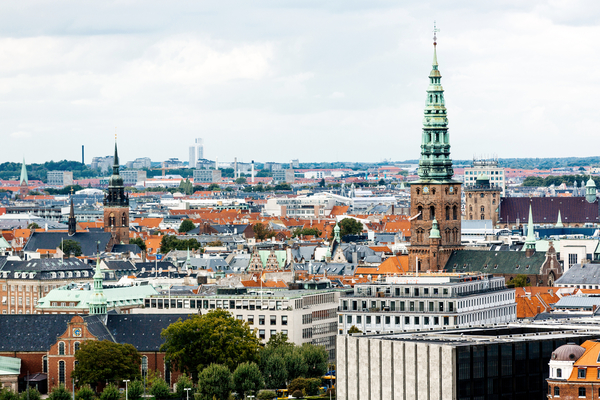What does the future of work hold for us as we enter a troubling and turbulent 2020? Mass automation and unemployment – or a brave new techno-utopia?
The robots are coming
Labour is shifting – and I don’t just mean the political party. Financial Times analysis suggested that fewer blue-collar workers in routine and semi-routine jobs than ever before voted for the Labour party in the December general election. It is tempting to ask: if Labour is no longer for everyday labour, then what is it for?
But this is about something much bigger than the fate of one political party. It’s about work itself and the necessity for a new, transformational good work agenda. For even if you rejoiced at the return of the majority government – even if you see real opportunity in the Conservatives’ one-nation agenda – there is no doubt that schisms lie ahead.
The Conservatives’ manifesto was (purposefully?) thin when it came to the detail on how to counter the effects of mass automation and shifting employment in the Age of the Robot. Long-term depression or a brave new techno-utopia for tomorrow’s workers? These questions remain unanswered.
There are many predictions that promise to illuminate the way. Oxford University’s Carl Frey famously predicted in 2013 that 47 percent of American jobs could be lost to robots (35 percent in the UK). The OECD reckons that 10 percent of UK jobs are at significant risk of automation; McKinsey puts the figure closer to 5 percent. PwC, meanwhile, thinks that as many jobs will be created as destroyed by new innovations. The MIT Tech Review has identified no fewer than 18 separate predictions, all of which speak to the mantra that ‘the robots are coming and it’s your job they want.’
Robotics, artificial intelligence (AI), automation, platforms like Uber and Deliveroo – these ‘radical technologies’ are already radically changing the workplace. In Estonia they are trialling AI judges, while Chinese retail giant Alibaba is in a race with Amazon over how quickly it will roboticise its warehouses. How this affects workers is invariably split along socio-economic lines: while some of us enjoy flexible working and massages at work, many more labour under zero-hours contracts and live a hand-to-mouth existence.
Technology can liberate us and set us free; take human potential to new heights. But it can also cause tumult and dismay in the absence of an empowering political agenda. How can we embrace the good while shifting our systems to mitigate the bad? How can we as workers take control of our destinies, whichever direction they take us? How might more of us find some way to wrest back control of our working futures from the robots of tomorrow and today and those who would seek to ignore their plight amidst excitement about the new technological revolution?
These are difficult questions, not readily answered by the slew of this or that prediction, soundbite or slogan. And yet, the answers are within our grasp if we care to delve deeper.
The four futures
Throughout history, technology has been one of the most impactful determinants of economic progress. Our capacity to survive and thrive at unparalleled scale rests on the seedbed of technological transfer and take-up. However, when societies fail to provide security for workers affected by technological change, terrible things happen.
You may be forgiven for thinking that these times are already upon us. Today we see workers protest for their futures all over the planet. Adult nappies are found in certain warehouses in lieu of toilet breaks. Reports of inhumane practices by technological employers speak to a widening gulf between capital and labour in the 21st century.
New analysis released at 2019’s close from my team at the RSA’s Future Work Centre has revealed winners and losers of the ‘noughties.’ 289,000 high street jobs lost over the last decade, 81 percent of which were held by women. Cashiers, administrators, bank clerks, PAs and hairdressers have been among the hardest hit by labour market shifts in the 2010s. Conversely, van drivers, software programmers and care workers have enjoyed the biggest jobs growth.
In the 2020s, Brexit, climate change, the ageing society, the pace of technological change, continued dominance of tech giants, the risk of another 2008-style crash and global political turmoil could all impact on jobs.
This context – and the promise of a future of ever increasing tumult in the absence of deep engagement and action – has been the backdrop for much of the RSA’s work.
For the last two years the Future Work Centre team has been travelling the country and the globe trying to understand how we might respond to these issues. Our remit has been to explore how to bring about a better the future of work in the age of radical technologies; to build on predictions and develop a detailed understanding of how to mitigate technology’s worst excesses and, more importantly, how to embrace its capacity for human fulfilment.
We have collaborated with technologists, union leaders, policymakers, employers and employees from all over the world to try and understand the issues and craft solutions. We have seen heartless labour practises up close – and have seen hope flourish in the practises of good firms, unions and co-operatives, in the arcane skunkworks of hackers and coders.
Predictions have been part of the conversation; but so too have scenarios for the future. It is one thing to deal in single-serve statistics, but it is another to ask: what might the future of work feel and look like if we go down this or that rabbit hole? What kind of conversations – and imperatives – does imaginative futurology bring? This kind of conversation leads to an altogether richer set of theories and conclusions than emerge from this or that prediction.
To aid this conversation, the Future Work Centre developed The Four Futures of Work, a series of original scenarios for the near-future of technology’s development (to 2035). These scenarios, co-created with technologists, companies, employees, regulators and futurologists, enable conversations about the unknowable future to take place: they are not about predicting for the sake of it, but instead empowering the listener or reader to engage.
What are the four futures? They are:
- The Big Tech Economy: this is a world in which tech companies proliferate and curb worker rights through sophisticated corporate social responsibility campaigns. Tech development accelerates in every direction. Potential future growth jobs in this area include software developers, digital transformation consultants, tech PRs.
- The Precision Economy: a world in which surveillance culture trumps all. The internet of things is the tech of choice. Warehouses and white-collar workers alike are tagged and tailed ad nauseam. Potential future growth jobs in this area include behavioural scientists, data analysts, online reputation managers.
- The Exodus Economy: a world in which financial or environmental events prompt recession and technological reversal. Worker co-ops make a comeback; working lives are intertwined with leisure. Potential future growth jobs in this area include: food cooperative workers, upcycled clothing designers, community energy managers.
- The Empathy Economy: a world in which all that can be automated is automated, leaving humans to do hi-touch, high empathy jobs. Robots now perform surgery, but it’s a human who is paid to tell you how long you have to live… and potential future growth jobs in this area include: digital detox planners, personal PR advisers and social media infometers.
The actual future will comprise some form of each of these scenarios - and these new, insurgent job families. There will be many losers too; the point is that we need to be ready to flex; to craft future policies that prepare workers of all stripes to take on any scenario that comes their way. We need to be ready to think in terms of shifting multiple policy systems in order to ensure a better future of work for all.
Once we realise that we have in our grasp pretty much the entire gamut of possibility (filtered for extreme events like financial collapse or climate emergency, say) the future becomes that much more knowable, and our agency much vaster. The things we need to do together become much clearer, and a pathway to a policy agenda that empowers workers becomes much more credible and deliverable. We are beyond the realm of prediction and into the realm of power.
A new ‘bundle’
Laetita Vitaud, author and RSA Future Work Centre collaborator, has called the 20th century employer-employee ‘bundle’ a ‘division of labour in exchange for a bundle of benefits and securityv.’ But the institutional approaches – employment legislation, tax and benefits, education and training – that make up this ‘bundle’ are still stuck in a world built around traditional one-employer, full-time employment.
In no scenario does that settlement still hold. So how do we update the bundle for the Age of the Robot in an equitable and fair way? Put another way, how do we update the entire system of social security that cuts across sectors and institutions to future-proof the livelihoods of workers of all kinds?
Conversations about the Four Futures have begun to show us what, at minimum, needs to happen. Corralling the many responses to our scenarios is a mammoth exercise. Putting it in its simplest terms (and even this is somewhat reductive), a ‘systems’ approach to responding to the challenges is required, covering multiple horizons and perspectives, if we are to face the future without fear.
One way to comprehend the various systems in play is to split them up by scale: to think macro,meso,micro. Consider the macro level. More GDP than ever is going to capital over labour. Superstar firms have changed the game. Innovative tax policy must be part of the answer, but so must innovative ways to support workers through fiscal policy. What about three- or four-day working weeks and universal basic income, as the RSA has supported through experiments in Fife and other places? These may have been put in the “too difficult” box by the election aftermath, we should consider where they or policies that speak to their concerns – the casualisation of labour, the need for greater economic security - sit as part of a renewed bundle. Could they or policies in their vein be part of a new approach to social security that mirrors an ever-more flexible labour market?
A systems approach does not just involve state intervention. Union-driven reform and evolution – at the institutional or ‘meso’ level – is key. Radical technologies – especially platforms which depend upon connecting demand for labour with an on-tap community of workers – need organised labour in order to continue to offer a viable, sustainable product. Are the unions of today taking that opportunity and responding to the flexible conditions of today with an agenda that maximises the potential for human fulfilment offered by the robot age? Some countries’ unions are doing this better than others – especially the Nordics, whose white-collar unions are actively working with platforms (for example, at Unionen in Sweden). We can learn lessons from them and bring policymakers together with labour institutions to deliver flexibility alongside economic security.
The private sector and its support systems must also play their part. Good for me, good for my worker: that’s the minimum we expect from employers. What does this look like in our time? We need new models such as portable benefits, with companies collaborating to allow gig economy workers to keep their perks wherever they go. Take Uber and Lyft in San Francisco, for example: two companies who have met to discuss allowing their drivers to keep their perks and even their ratings. Will it work? It’s too early to say, but it’s clear that we need to accelerate collaboration. Whatever we think of platforms and their (at times) sharp practices, we cannot expect an undertaking as epochal as the new bundle to be delivered without their involvement.
There are many great examples of system-wide change already in the ether. The Mondragon company in Spain is the largest co-operative in the world. The RSA Future Work Centre partners ALT/Now have seen first hand how it is bringing together its network of workers and businesses in historically high-polluting industries to strategically create an environmentally friendly new ‘bundle’ for its workers. Mondragon is in many ways a special case; a highly interdependent network of organisations. But no company is an island. We can all learn the lessons of co-operation and resilience through solidarity and strategic intervention. We must all work to shift these systems together.
Like water for chocolate
In the 1800s chocolate makers Cadburys empowered their chocolate and cocoa factory workers by providing high-quality accommodation, exercise areas, pensions and union rights out of philanthropic largesse and in deference to their Quaker faith.
Admirable as this is – and an example that no doubt appeals to the conservative instincts of many of the new ruling party’s voters – no one philanthropist, agency or institution can provide these services in the uncertain, constantly changing world of the near future. Collaboration, workplace democracy and humanism in the face of technological change to 2035 and beyond that: these are the touchstones by which we prepare all workers, come what may.
Perhaps we can agree on this and forge a way forward. An inspiring agenda that takes the best of technology and turns it into a renewed social contract for workers everywhere. The numbers of workers displaced by the remorseless rise of tech may well be vast. Automation could change the livelihoods of nearly a billion people – or half that. We need to be ready, n0t just to mitigate, but to empower.
I interviewed Carl Frey at RSA House this year and his predictions are indeed compelling, both in the sophistication of the analysis but also their power to arouse emotions. Our job is to channel the numbers through our account of the future; to build ever more detailed scenarios; to have better conversations with more diverse audiences and to drive real impact. That is the RSA Future Work Centre’s plan for the year ahead and we welcome policymakers and practitioners of all stripes to join us in that journey.
At times our call will be ‘bring on the robots’; at times it will be ‘we shall not be automated.’ Our leitmotif regardless will be to realise the potential of the human and of technology in our time; to ensure that the future of our livelihoods and our lives remain in our hands. And to continue the conversation about the workplaces of the future with the workers of the present.
Related articles
-
The future of work in Denmark
Fabian Wallace-Stephens
Collective agreements in the gig economy. A flexible approach to economic security. Trade unions using technology to redesign jobs. What can we learn from the future of work in Denmark?
-
Citizens, not algorithms, must shape progress
Matthew Taylor
The strident voice of today's tech evangelists bears a striking similarity to that of the champions of globalisation before 2008. There are important lessons to be learnt.



Join the discussion
Comments
Please login to post a comment or reply
Don't have an account? Click here to register.
We're 6 years into the 10 year event horizon of Frey's prediction. How many of the ~40% of jobs that he predicted would be automated have been so? Do we hold people to account before continuing to spread their thinking as an inevitable truth?